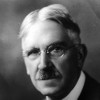“ But much work in school consists in setting up rules by which pupils are to act of such a sort that even after pupils have acted, they are not led to see the connection between the result—say the answer—and the method pursued. ”
John Dewey, Democracy and Education (1916). copy citation
| Author | John Dewey |
|---|---|
| Source | Democracy and Education |
| Topic | connection school |
| Date | 1916 |
| Language | English |
| Reference | |
| Note | |
| Weblink | http://www.gutenberg.org/files/852/852-h/852-h.htm |
Context
“One may learn by doing something which he does not understand; even in the most intelligent action, we do much which we do not mean, because the largest portion of the connections of the act we consciously intend are not perceived or anticipated. But we learn only because after the act is performed we note results which we had not noted before. But much work in school consists in setting up rules by which pupils are to act of such a sort that even after pupils have acted, they are not led to see the connection between the result—say the answer—and the method pursued. So far as they are concerned, the whole thing is a trick and a kind of miracle. Such action is essentially capricious, and leads to capricious habits. (b) Routine action, action which is automatic, may increase skill to do a particular thing.”
source

